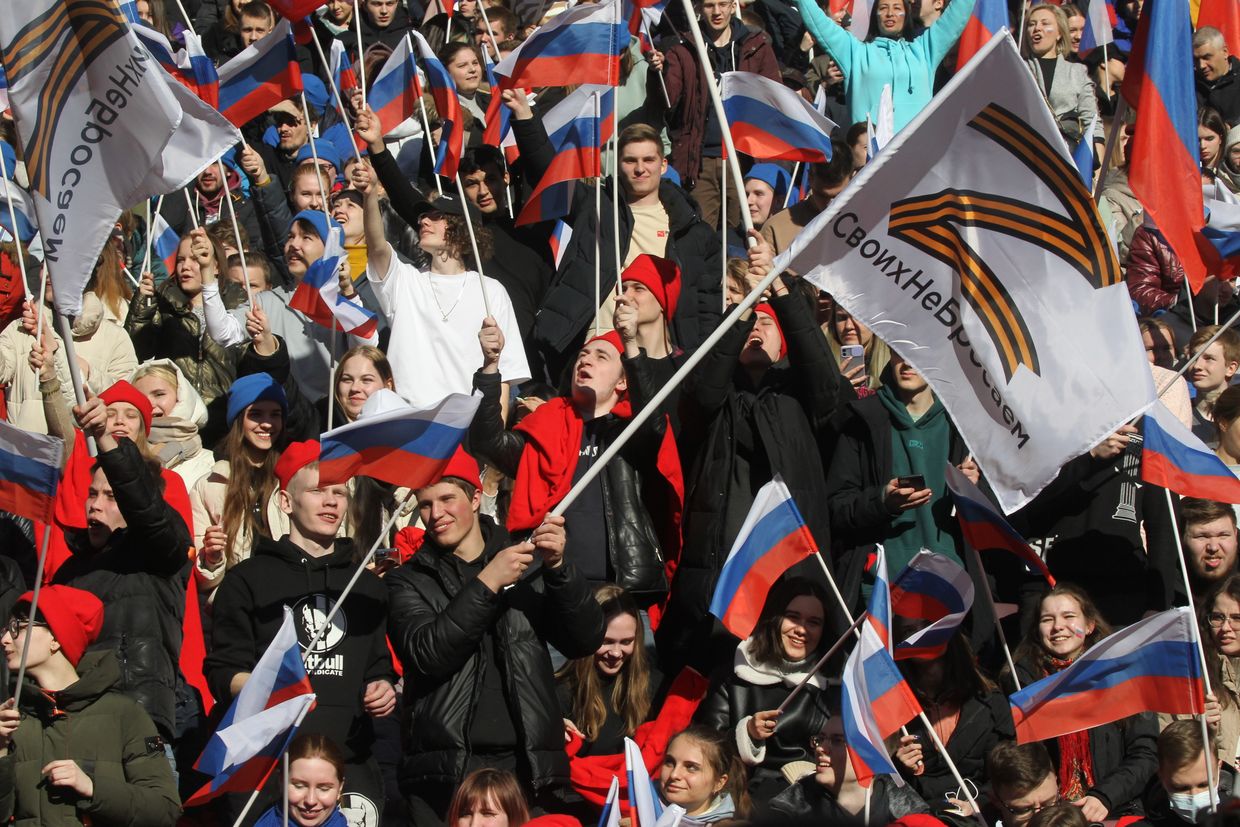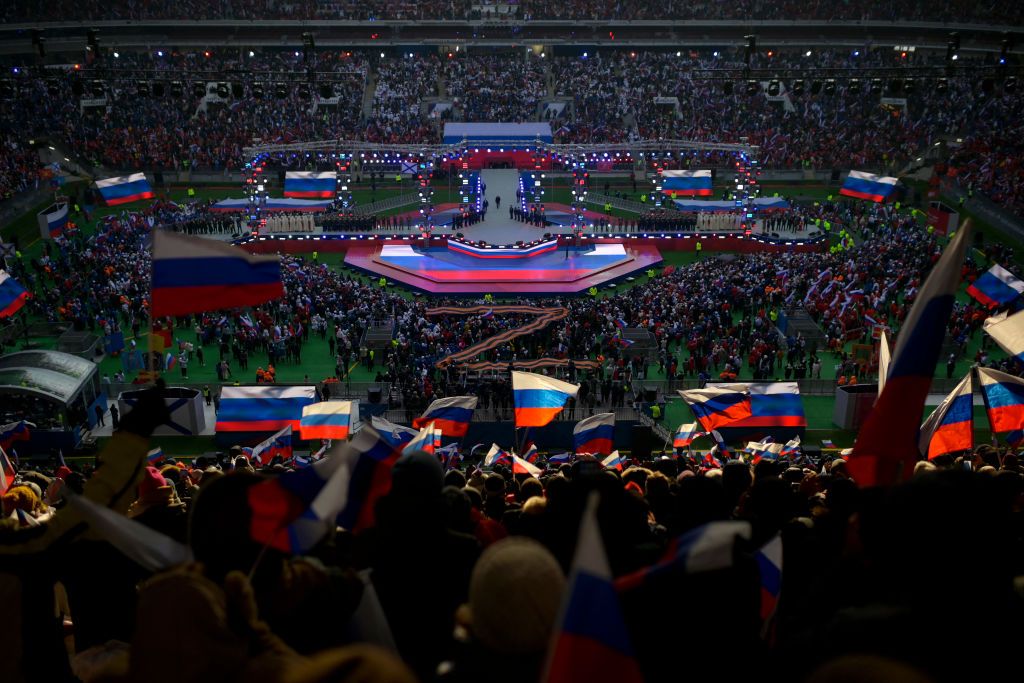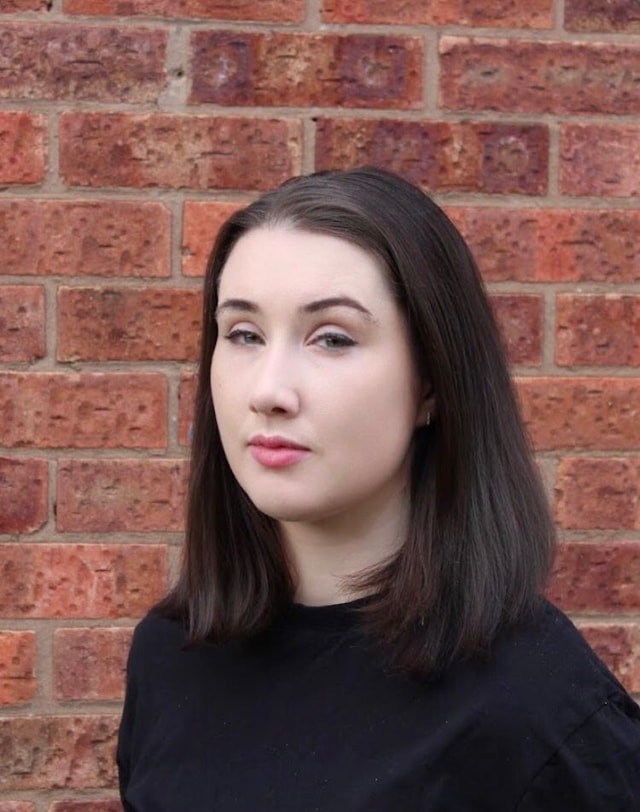Russia’s highly-militarized Victory Day celebration has nothing to do with WWII

A gala concert held in Red Square to mark the 70th anniversary of Victory in World War II in Moscow, Russia, on May 9, 2015. (Host photo agency / RIA Novosti via Getty Images)
The legacy of Soviet victory over Nazi Germany feeds pro-war aggression in Putin’s Russia — and is celebrated with a religious fervor.
When Russian President Vladimir Putin swept into power in 2000, he faced a divided land. The disintegration of the Soviet Union and the economic downturn that followed left deep scars on Russian society. Many felt that Russia had suffered a national humiliation.
Putin needed a common cause that would unite the masses. The revival of the Russian Orthodox Church, backed at the highest levels of government, was one such step. Yet Russia, with its patchwork of peoples and ethnicities, is not a wholly Christian state.
Something else was needed.
The answer lay in the legacy of the mostly forgotten World War II – a historical event in which Russia could have real pride, and one that had touched almost every family in the Soviet Union.
Under Putin’s rule, the memory of the Soviet victory over Nazi Germany became synonymous with increasingly grandiose public celebrations, permeating every corner of public life.
But the Kremlin would also warp wartime memory for its own ends. The memory of a defensive war became an all-encompassing national myth: a rallying cry for patriotism and an endless source of propaganda.


Most of all, it has become a validation for Russian aggression in Ukraine, with the Kremlin conjuring images of a “neo-Nazi threat” in Kyiv to justify its invasion.
“There's been a massive perversion of memory on every level in the Russian state, starting from the Kremlin on TV and going all the way down to Russian high school textbooks,” says Katia Patin, a journalist who has worked extensively covering the battle for historical memory in authoritarian regimes.
“They all draw this twisted continuity from World War II to the war in Ukraine in a way that's completely inaccurate. Decades have passed. But for the Kremlin, it’s vital to show the absolute continuity between those two events.”
Changing focus
World War II — known in Russia as the Great Patriotic War — devastated the Soviet Union. Some 27 million soldiers and civilians died defending their country from fascist troops before victory was won over Nazi Germany.
But how that victory is celebrated has changed dramatically over the past 79 years. On the original Victory Day on May 9, 1945, spontaneous celebrations swept the country; the official victory parade in June saw Soviet troops throw hundreds of captured Nazi banners before Lenin’s mausoleum.
For the next two years, celebrations took place in cities and villages across the country.
Then, in late 1947, the Supreme Soviet declared that Victory Day would no longer be regarded as a non-working holiday. Commemorations would instead be centered around the workplace or feature small gatherings of local veterans.
“It was very understated,” says Jonathan Brunstedt, an assistant professor of history at Texas A&M University focusing on nationalism and historical memory in the Soviet Union.
“It was a routine day, other than perhaps some competition in the workplace: ‘We’ll produce even more (at our factory) this year in honor of our victory’ and so on.”
The idea of Victory Day as a non-working holiday wasn’t revived until 1965. Yet the date still lacked the regular, grandiose celebrations we see today.
The annual Victory Day parade in Moscow was not greenlit until 1995.
Formerly, the parades were seen only on two special occasions: the 20th and 40th anniversaries of Victory Day in 1965 and 1985.
There are other key differences between modern and Soviet war commemorations.
Officials previously lauded victory as a multinational effort, the collective efforts of the distinct Soviet peoples, says Brunstedt. Under Putin’s rule, that rhetoric has been swept away to reframe victory as a Russian achievement, diminishing the role played by minorities and conveniently ignoring Soviet recognition of countries such as Ukraine as separate nations.
The tone of the commemorations has also shifted from mourning to celebration.
“In the Soviet era, during these big celebrations, there was much more of a sense of collective grieving. There was rhetoric about what we have lost,” says Brunstedt. “Today, the focus is much more on victory and heroism rather than sacrifice.”
Controlling the narrative
This changing narrative has become increasingly apparent over the past decade as the Russian state has become more involved in Victory Day celebrations. Events such as the Immortal Regiment—where Russians march through the streets with portraits of their veteran family members—began life as a genuine, grassroots movement for those who wished to reconnect with their family history.
But throughout the 2010s, Immortal Regiment marches were increasingly fronted by senior government figures, including Putin himself.


In the process, the Kremlin portrayed itself as the great protector of the war’s legacy, intrinsically tied to its ideals and uniquely placed to dictate its meaning.
Controlling history — and particularly wartime history — became a way for Moscow to mobilize the masses and inspire patriotism, says journalist Patin.
“History is an emotional topic. It's something that really moves people, and that's something that politicians — especially authoritarian-leaning politicians — understand on a fundamental level. It's so effective in drumming up support,” she says. “Reporting on the battles that surround historical memory is one part of understanding how these governments consolidate power.”
But as the Kremlin took control of the acts of remembrance that surrounded the war, it also took control of the conflict’s legacy. It began to use the war to justify its own military actions — including its war against Ukraine.
“On the eve of his full-scale invasion of Ukraine, Putin gave a speech in which he tried to portray the current government in Kyiv as a fascist regime run by neo-Nazis. He argued that Russia needed to intervene,” says David L. Hoffman, a professor of Russian and Soviet history at Ohio State University. “There is this direct parallel he tried to draw.”

However, the real benefit of using the past to justify the present is that it can be remolded and reshaped as many times as needed.
Moscow has long relied on accusations of Nazism to discredit Ukrainians pushing for independence from Russian control, says Jade McGlynn, a research fellow in the War Studies Department at King's College London and author of Memory Makers: The Politics of the Past in Russia.
“In 1991, Ukrainians who wanted independence were dismissed as Nazis by Soviet newspapers,” she says. “In 2004, anyone who supported the Orange Revolution was called a Nazi. And since 2014, and even more so since 2022, that rhetoric has exploded,” she says.
In 2024, in the eyes of the Kremlin, Nazism in Ukraine has come to mean anything which is anti-Russian, says McGlynn. “That has been a constant since 2014 — it’s the entire framework for how they see Ukraine and Ukrainian-ness,” she says.
Victims and victors
The commemoration of World War II in Russia today goes far beyond holidays such as Victory Day.
Its overarching presence goes far beyond similar celebrations seen in other eastern European countries, who also suffered devastatingly heavy losses in the conflict. There is a constant stream of movies and books, dress-up parties for children, patriotic flash mobs, school lessons, and extracurricular activities that echo the war throughout the present day.
A common catch phrase used by the general population buying into the increasingly militarized celebrations is “we can repeat.”
Wartime memorialization has taken on an almost religious fervor, says Patin. World War II-themed icons or imagery in Orthodox churches are not uncommon. “For many Russians, upholding the memory of World War II fills this space, the sense of loss that came after losing the Soviet Union,” she says.


Ultimately, the legacy of World War II has become a lens through which Russians can view themselves — one that encompasses both pride and glory, but also a deep sense of victimhood. It is one that many Russians embrace.
“Nazi Germany attacked the Soviet Union, including the territory of today's Russia,” says McGlynn.
“Bringing every conversation back to the ‘Great Patriotic War’ is a way of placing Russia in the position of the victim, rather than talking about how Russia is today — which is very much the aggressor state,” she says. “It’s getting domestic audiences to think about when their country was invaded, rather than about the fact that they are invading another country.”
















